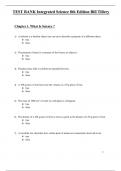Exam (elaborations)
Test Bank For Integrated Science 8th Edition By Bill Tillery, Eldon Enger, Frederick Ross. isbn. 9781260721485.
- Course
- Institution
Test Bank Integrated Science 8th Edition By Bill Tillery, Eldon Enger, Frederick Ross. isbn. 9781260721485. Integrated Science 8e test bank. Tillery 8e test bank for Integrated Science. Table of Contents-=Chapter 1. What Is Science Chapter 2 Motion Chapter 3. Energy Chapter 4. Heat and Temperatur...
[Show more]



